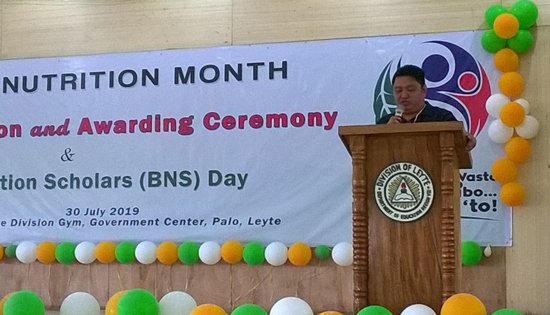|

Dr.
Ronelio Al K. Firmo, Leyte Schools Division superintendent,
reveals DepEd health and nutrition interventions in “Oplan
Kalusugan” during the 45th Nutrition Month celebration
culmination on July 30, 2019. |
Schools Division
chief bares ‘Oplan Kalusugan’
By
JACK C. GADAINGAN
September 4, 2019
GOVERNMENT CONTER,
Palo, Leyte – The Department of Education (DepEd) has
consolidated all its health programs, plans, policies, and
activities for their effective and efficient implementation at the
school level into “Oplan Kalusugan.”
Included in this
convergence of interventions are five flagship programs namely: 1.
The major school health and nutrition program specifically the
School-Based Feeding Program (SBFP); 2. National Drug Education
Program (NDEP); 3. Adolescent Reproductive Health Education (ARH);
4. Water, Sanitation, and Hygiene (WASH) in Schools (WinS); and 4.
Medical, Dental, and Nursing Services; and 5. Mental Health Program.
Dr. Ronelo Al K. Firmo,
Leyte Schools Division superintendent, revealed this in his welcome
address during the 45th Nutrition Month Celebration Culmination and
Awarding Ceremonies held at the DepEd Leyte Division Gymnasium, here
on July 30, 2019.
According to Firmo, in
regards to school-based feeding program the agency funds public
schools for a 120 feeding-day period, and the Leyte Division has
already released funds for the first 120 days feeding program of
schools under its jurisdiction, further asking the BNSs present to
provide guidance to school principals on what healthy foods to cook,
when they can.
He said that part of the
school-based feeding program is the Gulayan sa Paaralan, where
pupils are introduced early to learn on vegetable and food
production; as well as ensuring that only healthy foods are made
available in school canteens through DepED Order No. 13, s. 2017 or
“Policy and Guidelines on Healthy Food and Beverage Choices in
Schools and in DepEd Offices,” Firmo added.
It was further gathered
that the National Drug Education Program (NDEP), is included as
among the health interventions as problems on illegal drugs pose as
a bigger threat to the security and welfare of the youth and
students; the Adolescent Reproductive Health Education (ARH), to
address the burgeoning problem of teenage pregnancies, where many
misguided youths are enticed into risky sex behavior – resulting on
unwanted pregnancies causing the girls to drop-out of school,
lessening their chances of a better future;
Water, Sanitation, and
Hygiene (WASH) in Schools, aims to provide children with clean water
to use, as well as to teach them the importance of being clean and
on cleaning by themselves; Medical, Dental, and Nursing Services is
to maintain and improve the health of schoolchildren and school
personnel through the prevention and control of diseases; and Mental
Health Program, due that it was observed a number of children are
actually suffering from mental problems.